
|
|
In Memory's Eye Recollections of Canadian Parliamentarians Honourable Members - Part 2
A tall, sparse man, slightly stooped from years of bending over patients, accident victims, or people who had fainted, he was kindly man. Being the first on the spot when someone was suddenly seized with illness he knew what to do and, more importantly, what not to do until better equipped emergency personnel arrived on the scene, or an ambulance arrived to transport the afflicted one to hospital. He represented all that was best in the medical practitioners of his times. In his very person he exuded a comforting feeling. Had Norman Rockwell ever needed a subject to portray a caring, competent, compassionate man of medicine, Dr. Rynard fitted the description to perfection. I remember him hurrying to the Hansard offices when one staff member suffered a blackout, and know he attended several fellow Members of the House on similar occasions without thought of party distinctions, knowing only that a human being needed attention quickly. Dr. Rynard was a cattle breeder in later years, and was the proud owner of Huronia Heights Holsteins of Orillia, a nationally known herd. He was a member of the Progressive Conservative Party, but forever first and foremost a doctor of whom all members of the Canadian medical profession could be proud. He was a good man.
It was May 18, 1966, and a bomb had just gone off in one of the washrooms outside the Ladies Gallery. There was a loud "whomp" heard in the Commons Chamber, and a number of Members hurriedly ran out of it. Diefenbaker, who had not been paying attention to the Member who was addressing the Chamber at the time, thought the hubbub had something to do with what that Member had said, hence his question, "What did he say, Mike? What did he say?" Had the bomb not exploded prematurely in the washroom, had its maker made his way into the Ladies Gallery and tossed it into the middle of the Chamber, Starr, Diefenbaker, and other members could have been killed. Hansard would also have lost one of its best reporters, Jack Dyer, an Albertan and proud westerner, who was the reporter on the floor at the time. Paul Joseph Chartier, the man who brought the bomb into Parliament, was killed in the washroom when it exploded prematurely. He was described as a person of deranged mind. In present-day parlance he would be called a terrorist. Starr deserves much more than mention of his being in the Commons on that day. He was the son of Ukrainian immigrants, and had a distinguished career in municipal politics before winning a seat in the federal Parliament in a 1952 by-election. For the next sixteen years he was a tireless worker for party, riding, and country, and was appointed Minister of Labour by Diefenbaker in 1957. A plain speaker, he gained respect for the sincerity with which he expressed his views. His ministerial portfolio earned him valuable experience which he brought with him when he was appointed Chairman of the Workmen's Compensation Board of Ontario in 1973.
His is a story the telling and retelling of which will be an inspiration to Canadians for generations to come. He was the only black man in Canada elected a Member of Parliament during my early years with the House. Lincoln Alexander was a big man in every sense. He served his country as a member of the Royal Canadian Air Force during World War II. He was a lawyer. He had an impressive record in labour matters as president of a number of boards and associations, including the International Association of Industrial Boards and Commissions, and the Association of Workers Compensation Boards of Canada. He was chosen Man of the Year by the Ethnic Press Council of Canada in 1982. The list of honours and accomplishments goes on and on. He was elected a member of the House of Commons in 1968, and retained his seat through five general elections in total. In 1979 he was appointed Minister of Labour in the short-lived Progressive Conservative government of Joe Clark, and on resigning from the Commons in 1980 took over Mike Starr's position with the Ontario WCB. He later became Lieutenant General of Ontario, in which post his popularity grew and grew. With deep voice, firm handshake, and a great sense of humour, Alexander, the son of a railway porter, pioneered a path for others to follow in the multi-racial Canada of coming years. Most modern electronic audio equipment has it, and indeed old-fashioned battery operated radio sets had it, the "it" being a device to modulate volume, ranging from very low, through medium, and on to high. I often thought that some Members of Parliament should have been fitted with such a tuning knob or button in an era when the Commons Chamber lacked any but the most rudimentary sound system. Microphones were suspended from on high, at fixed intervals, and if a soft voiced Member happened to be seated at a distance from one of them, it was a heck of a job to hear him. Sometimes the system operators were slow to switch on a dead microphone, and even the Speaker might find himself missing amplification at vital moments. As the years passed many improvements were made, and now each Member has a microphone on the desk in front of him or her. Three members in particular did not require any mechanical aid to make themselves heard, Ralph Cowan, Ray Perrault, and Eldon Woolliams.
Cowan and Perrault were Liberals, Woolliams a Conservative. Cowan represented a Toronto constituency, Perrault hailed from British Columbia, and Woolliams was the member for Bow River in Alberta. Cowan held a managing position on the distribution staff of a daily newspaper, Perrault was an advertising and public relations consultant, and Woolliams was a barrister. Cowan barked, Perrault bellowed, and Woolliams boomed, easily out throating his two rivals in decibels. There was never any need to ask who was speaking when Woolliams held the floor. He could easily be heard on third floor corridors at distances of twenty, thirty or more yards from the doors to the public galleries. The Hansard offices were that distance away, and to what I write I can attest. It might seem that the loudly barking, bellowing, booming trio were the answer to a Hansard reporter's prayer, members who could at least be heard, but sometimes a prayer is answered in spades, and a loud, loud voice can have a jarring effect on the sensitive link between ear, brain, arm, hand, and fingers wielding pens writing shorthand or tapping silently on stenotype keys. Cowan's time in Parliament was short, Perrault became a Senator, our gift to the Senate Hansard reporters, and Woolliams returned to Calgary where he was an outspoken spokesman for the oil industry.
He qualified as a barrister in 1941, and that same year joined the Royal Canadian Navy in which he served throughout the years of World War II, rejoining civil life in 1945. He was a man with a heart and a conscience. Before his arrival in Ottawa he served as Secretary of the Québec Commission on the Rights of Married Women, and as Secretary of the Québec Commission on Juvenile Delinquency. He was first elected to the House of Commons in 1949, and re-elected in 1953, 1957, 1958, 1962, and 1963. Such electoral successes and his own unquestionable talents warranted recognition, and in 1957 he gained a seat in the Cabinet of Prime Minister Diefenbaker as Solicitor General, and later in 1960 as Minister of Transport. There was one position that Diefenbaker denied him, that of his Québec lieutenant, a seemingly nominal appointment but one which meant a lot in the political climate of the times. Had he been made political minister with responsibility for Québec, he might have saved his party's long years spent in Opposition through the Trudeau era, but Diefenbaker disliked delegating responsibility. Balcer served him without publicly complaining, but finally was driven to part company with him on a matter of principle. The story of Léon Balcer yet remains to be told in full. His service to province and country should never be forgotten.
A number of things set him aside from the run of western members in the years before the advent of cohesive groups advocating parliamentary reform, such as the Reform Party headed by Preston Manning, and its successor, the Canadian Alliance Party, and its leader, Stephen Harper. The Standing Orders of the House were not the most popular item on the agenda of those who first elected him to represent their interests in Ottawa in 1958. They did, however, respect the stand he took when seeking to modernize them, and re-elected him general election after general election. Jed Baldwin was a tall, well physiqued figure, a plain spoken, mannerly individual who never raised his voice to overwhelm, content to let the soundness of his arguments sway his colleagues. He had the somewhat unusual claim to being born in the southern latitudes, New Zealand to be precise, in 1907, but grew up and was educated in Canada where he entered the legal profession as a barrister. Jed Baldwin served Canada in war in peace. During World War II he was a member of the Royal Canadian Air Force and served overseas in England and Europe. With his legal training, military discipline, and inward self-conviction, he was an ideal parliamentarian who took to life in the Commons as the natural environment in which he could best exercise his talents. He got along with members in all parties, and over time came to be regarded as one of the finest minds dealing with the seemingly arcane mysteries of parliamentary rules of procedure.
The Honourable William Moore Benedickson (Kenora-Rainy River) was one of the most agreeable, affable men in the Commons of his time. He was handsome, no doubt a tribute to his Icelandic and Canadian heritage, and had a distinguished war record, rising to the rank of Wing-Commander in the Royal Canadian Air Force. He was first elected a Member of Parliament in 1945, and won re-election in six more successive general elections. As spouse and helpmate he was fortunate in having won the hand of Agnes Richardson, a member of the prominent Richardson family of Winnipeg. As a war veteran he shared with many of his colleagues in Parliament that tie which bound together those who had risked all in defence of Canada and of the western democracies against attack by the combined forces of nazism and fascism. One of his earliest stints as a parliamentary assistant was with the legendary Douglas Abbott, Minister of Finance in the cabinets of Mackenzie King and Louis St. Laurent In 1963 he himself joined the cabinet of Lester Pearson as Minister of Mines and Technical Surveys, and two years later was appointed a Senator. Bill Benedickson, a Liberal in all but name, carried with him the rather singular party designation of Liberal-Labour during his many years in Parliament. It was a mark of independence, of the man, of his background, of his thinking, and in no way hindered his advancement politically and otherwise. No mention of his services can be complete without reference to the life-long commitment of his wife, the aforementioned Agnes, in support of education, the arts, and charities, in Canada and elsewhere.
He had attained the status of elder party counsellor by the time I first started reporting his speeches and interjections in debate in the House of Commons. He was a gruff, outspoken man, bald headed except for a circling white fringe of hair, and given to choleric, fiery outbursts at what he deemed the dastardly conduct of members of other political parties. He had earned the right to speak his mind. In World War I, "the war to end all wars", he served in Europe as a Vickers machine gunner, beginning in 1916 as an 18 years old volunteer, and in World War II, at age 41, he answered the call to arms again, this time with the Fort Garry Horse and later as Commanding Officer of the 1st Canadian Armoured Regiment in northwest Europe. Gordon Churchill took his place in the political life of Manitoba where he was first elected to the provincial legislature as an Army Representative, and sat as an Independent from 1946 to 1949. From 1951 to 1968 he sat as the Member of Parliament for Winnipeg South Centre, one of the longer serving members in an era when a lifelong career in national politics was regarded as a very honourable occupation, unlike the in-and-out two-term politicians of later years. In 1957, when the Progressive Conservative Party finally regained office, after an interval of twenty-two years since 1935 when R. B. Bennett was Prime Minister, Gordon Churchill became Minister of Trade and Commerce in Diefenbaker's first cabinet, and later held the posts of Minister of Veterans Affairs and Minister of National Defence. Doughty fighter in war and peace, he had a personal code of honour which he upheld even to the extent of opposing Diefenbaker and assisting to precipitate the general election of 1963 which once more condemned the Progressive Conservatives to the role of Official Opposition for many years. Gordon Churchill fought the good fight, fought hard and cleanly, and both country and party have reason to celebrate his life and his deeds.
Solely from the perspective of Hansard reporters, we lamented the loss of some good speakers from Parliament, and wondered about those who had won seats for the first time. Abruptly we were startled to hear a new voice. One of the newcomers was being interviewed, a Québecer, about whom we knew nothing. He was speaking English. Not only was he masterfully fluent, but the words he spoke were delivered with machine gun velocity. We realised at once that we would need to be fully alert when it fell our lot to take down his speeches in shorthand whenever he addressed the House. The new man was Réal Caouette, the Member for Temiskamingue, who flashed across the political scene like a comet, and left it all too quickly after an electrifying career. If populist could define anyone exactly, that person was Caouette. He had a personal magnetism that drew attention wherever and whenever he spoke. And he was sincere in what he said. The social credit theories of Major Douglas, a Scot and a student of economics, had been embraced with enthusiasm by followers in many parts of the globe. They particularly appealed to the disadvantaged and those who had suffered the most in the Depression years of the 1930s. Western Canada was fertile ground, and Social Credit leaders like William Aberhart drew huge support in Alberta. Bob Thompson was the one to bring Social Credit to the fore in federal politics, and Réal Caouette was his Québec lieutenant. At least it started out that way. But Caouette soon described himself as co-leader of the party, and over time eclipsed Thompson by sheer charisma. This was long before that quality was most eagerly sought in would-be political leaders, culminating in its almost copyright attachment to Pierre Elliot Trudeau, the spectacular new-style Prime Minister who succeeded Lester Pearson. In time Caouette and Thompson parted company, Caouette to found the Creditiste Party confined to Québec, and Thompson to struggle on as head of the depleted Social Credit Party in Ottawa. Old fashioned descriptions of Réal Caouette by political commentators of the day talked about "the firebrand from Québec", whose speeches were "barn burners". They were scintillating, and sincere. Caouette was not a Québec separatist. He had an intense love of Canada, and his Canada extended "from sea to sea to sea", a phrase he often used, thus bringing Canadian sovereignty in the Arctic into the public consciousness of new generations. It was hard, if not impossible, to find anyone who was not touched by his presence during his years in Ottawa. Some few words may have inflicted hurt on others, but the geniality of the man belied any personal animosity to those who were so offended. His rapid manner of speaking made those who reported him work hard, but he brightened their day, and he enlivened proceedings at a time when the House of Commons lacked sparkle and was the preserve of the dull and dreary. Those who knew him, who saw him, who heard him, will not forget Réal Caouette.
That he was earnest and well-meaning was evident to political friend and foe alike, but where he drew his inner strength from remained hidden from public view. He did have one unique, almost unbelievable distinction for a Canadian, for a westerner at that, indeed for a white male Caucasian. He befriended royalty. Somewhere along his path he became a teacher to the young family of a king, and not just any king, an Emperor! The Lion of Judah, with a lineage going back a thousand years, was one of the most tragic figures in twentieth century world history. Emperor of Abyssinia, he first fell victim to the Italian dictator, Benito Mussolini, whose army and air force ravaged his country as a prelude to becoming a partner of Adolph Hitler, the Nazi German dictator who waged war on Poland, France, Belgium, Holland, Russia, and other nations, including Britain and United States of America. Helai Selassi was a man of singularly small stature among world leaders of his day. The victim of a bully armed with powerful planes and tanks, he was isolated, and he earned the sympathy of other peoples in countries that were members of the League of Nations, that international body set up after World War I to safeguard world peace and end international aggression. Sympathy was all Selassi and his people received from the League of Nations. Not to recapitulate all the history leading to the overthrow of the House of Selassi, suffice it to say that Bob Thompson was entrusted with the safety of some of the royal children, and oversaw their education and political refuge far from their native Abyssinia. Thompson was held in the highest esteem by his constituents. He was known to everyone. I vividly recall being besieged for tales of his doings in Ottawa by patrons of an hotel beer parlour in Three Hills, where I spent my honeymoon. I mean the town, not the beer parlour. "What in under-" Don't ask. I did. They asked about him, eager to know how their man was regarded in far off Ottawa. His farm was pointed out to me, as well as the three hills. I also visited Two Hills, another town not so far away, and later some big hills in the far distance called the Rockies. Bob Thompson did many good things during his lifetime. One of them was the now unremembered caring face he gave Canada and Canadians by the compassion and concern he showed for the children of the Emperor of Abyssinia, the Lion of Judah. Now to answer the interrupted question. A honeymoon can be a highly educational experience. How else could I have gained the knowledge I possess? Now I know that Three Hills is in the midst of the Canadian Bible Belt and houses no fewer than three Bible colleges or schools.
Over the decades Stanley Knowles (Winnipeg North Centre) became known as "Mr. Parliament" to friends, colleagues, fellow workers in every nook and cranny of Parliament Hill, to members of the media, and the public at large. Much was written about him while he lived, and he will continue to be a reference point for decades to come for all who write about Canadian politics. His compendium of papers, contained in at least thirteen filing cabinets which he donated to the National Archives, is a treasure trove that no future historian should overlook, no matter what the subject of inquiry may be. So well known did he become as an advocate of lowly paid pensioners and all who suffered the ills of deprivation and suffering, lack of medical care, and the indifference of the affluent, that he received correspondence from every region of the country, not just from his own constituency, and became a national one-man social reformer. His ceaseless prodding of governments led to many advances in health and welfare programs. And he achieved this without histrionics. Stanley Knowles was a low toned speaker with just the hint of rasp in his voice. He was a joy to report. He spoke in sentences that needed no emendation. The words flowed into the shorthand script, and from there were dictated smoothly to an amanuensis whose keyboard skills tapped them into typewritten pages, free from error, and thence to final appearance in the printed pages of Hansard. Strangely, I came to know of him first by reputation. He wasn't even a Member of Parliament then. He had been a member from 1941 to 1958, and had lost his seat in the 1958 General Election. But even in his absence he was often referred to, and with affection, by members of the Hansard staff. After he won re-election in 1962, from then until 1994 I came to know the man. As a daily visitor to the Hansard office during the weeks, months, and years that Parliament was in session, he knew us by our first names, and in some way was regarded as a member of the family. "Was Mr. Knowles in today?" "No, he wasn't." "He wasn't in the House either. I hope he isn't sick." More than likely he was off on some official duty. As Chancellor of Brandon University he took his role seriously, attending Convocations and Conferrings even though this meant missing attendance in his beloved Commons. As the years rolled by we established a special bond. He discovered I had started out life as a printer, in fact grew up over a printing office, and from then on we shared the kinship that only the printing fraternity can know. As old printers we had much in common. Hot metal was in our blood. As I write this I have beside me two pages of a printing manual "Compiled and Printed by Stanley H. Knowles" when he attended the Manual Arts High School, Printing Department, in Los Angeles in 1922. One section is headed "Linotype Faces-One-line Specimens". Stanley showed me his and it was but fair that I showed him mine, "Hints to Linotype Learners"--published for the benefit of students only-by Linotype & Machinery Limited, 21 John Street, London, W.C.1. We talked the same language. We had each been splashed by molten metal at one time or another. We had handled newly cast metal slugs with fingers accustomed to their high heat, and passed them on to unsuspecting visitors who invariable yelped and dropped them. We could set type from case. I could go on and on. Stanley Knowles had been born an American, in Los Angeles, California, in 1908, and did not come to Canada until he was sixteen years old, in 1924. The sum total of his life in Canada, in particular his life in Parliament, has not yet appeared in a definitive biography. It merits handling by critical, competent, and kindly hands. In the later years of his life he suffered a severe illness from which he made a valiant recovery, though left with "only half a brain" as he himself joked. If others were only half as smart as Stanley was with his half a brain, there would be more clever people in Parliament. He was forever grateful to Prime Minister Trudeau who was instrumental in having him appointed an Honorary Officer of the House of Commons in 1984 on his retirement from active politics. Such an honorary appointment had been granted previous retirees who regarded it as just a formal compliment. Not Stanley. For years, at Question Period he occupied a special chair at the Clerk's Table in the House he loved so well. "Pierre gave me a new life, a reason for going on," he told me on one of his daily visits to Hansard. Stanley loved to talk about life in Parliament, reeling off story after story about events and people he had personal knowledge of, some even then almost gone from human memory. From him I learned much. He carried his printers' union card with him for life until the day came when he became one with his predecessors summed up in the saying: "Old printers never die. They just press on…" A copy of the Manual Arts Weekly dated December 4, 1923, published in Los Angeles, also lies beside me. It still makes lively reading eighty years after a young Stanley Knowles first worked on it.
There were the traditionalists, long accustomed to the Commons as a man's world, and there were those seeking to gain the long-sought recognition that women deserved equal status and had as much, if not more, to offer as parliamentarians as their male counterparts. Like their colleagues, the first women Members of Parliament came in only one colour, white, and they reflected the values of the society from which they came. Slowly, ever so slowly, other women from other cultures, other races, gained public recognition, and took their places either on the government or on the opposition side of the Chamber. One of the lady Members came from the ranks of the New Democratic Party which prided itself on championing what were called women's causes. Unwittingly Hansard aroused her passions. A rather discomfited Lorne Nystrom led her into the editor's office, introduced us, and her opening salvo caused Hansard to change forever the way it treated female M.P.s. "What do you mean calling me Miss?" "That's how we've always designated unmarried lady M.Ps." "Well that must change. I am Ms, and I insist on Ms. See to it." And out stormed Ms. Lynn McDonald, newly elected NDP Member for Toronto-Broadview. All right. If that was what the lady wanted, that was what the lady would get. But it wasn't that easy. There were two groups who espoused "Ms", the first styling it "Ms." with a full stop after the "s", and the second who insisted on "Ms" without period. Consultation with female staff revealed there were four groups, the traditional "Miss", the "Ms." the "Ms", and the "don't give a damns". The issue was decided when someone unearthed a women's magazine which styled itself "Ms." Thereafter, lady Members of Parliament had three choices -- Mrs., Miss, or Ms.-and as more and more women were elected, each was canvassed to learn which they preferred. The majority of the singles preferred "Miss". Men had to remain content with the traditional "Mr.". With that settled, Ms. McDonald went on to fill two terms as an M.P., but eventually had differences with her own colleagues in the New Democratic Party that a mere punctuation mark could not solve, and lost her seat. Born in Dublin, Ireland, she was educated at Trinity College, Dublin, and later at the London School of Economics. Aideen Nicholson had a career dominated by a happy combination of heart and brains. Her background in social work and her mastery of the "dismal science", economics, earned her well merited distinction in both fields. The list of her achievements before entering politics was impressive -- social worker and student instructor at Toronto's Hospital for Sick Children; teacher at George Brown and Sheridan Community Colleges, and the University of Toronto; work with Ontario Correctional Services; Director Cradleship Creche of Metro Toronto; member Toronto Arts Foundation; and founding member of the Ontario Commission on the Status of Women. She contested and won four General Elections, 1974, 1979, 1980, and 1984, and although quiet spoken and gentle in manner quickly achieved prominence in a number of Parliamentary Secretaryships. Her expertise and her worth were recognised when she was elected Chair of the prestigious Public Accounts Committee while serving as Official Opposition finance critic during the first four years of the Mulroney Progressive Conservative Government, 1984, 1985, 1986, and 1987. The Public Accounts Committee is charged with reviewing government expenditures, a very big job, and it requires great study and attention to detail. Aideen Nicholson served her party, her Parliament, her country, well in all her endeavours, and none better than in presiding impartially over the annual review of the manner in which taxpayers' money was spent by government. From Trinity College in Dublin to Trinity riding in Toronto, she shared her heart and mind with all during a remarkable career that has earned her a special place in the history of Canada's parliamentarians. Having lived in the city of her birth, we shared recollections on the few and all too brief occasions when her work brought her in touch with Hansard. Incidentally, she was always Miss Nicholson. I remember her fondly.
An intellectual with a personality, bright and honest, is the lasting impression she made during her twelve years as a Member of Parliament from 1972 to 1984. She could boast of birth in the Eternal City, but boasting was the farthest thing from the lady whose years at McGill University in Montreal and at the University of Paris were funded in large measure by scholarships she won as a student. After service with the Foundation Edouard-Montpetit she became a journalist in Québec, a member of the Canadian Women's Press Club, joined the provincial Department of Education, and later became executive secretary of the Royal Commission on the Status of Women in Canada. She held other positions, was a member of the Canadian Human Rights Foundation, of the Canadian Association of Gerontology, Societe qué de Science politique, and the Canadian Science Association. In Ottawa the Liberal Party knew they had a rising star in their ranks, and saw to her advancement by appointing her first as Parliamentary Secretary to the Secretary of State for External Affairs, followed by ministerial office as Minister of National Revenue, and seven years as Minister of National Health and Welfare. In the latter office she was an unwavering supporter of the federally and provincially funded National Health Act, and did much to assist alleviate the plight of the poorest in society. Quietly and effectively she espoused women's causes. Stridency was unknown in her approach to seeking solutions in welfare and health issues, and in her person she embodied human traits that came peeping through the ministerial aura of power surrounding holders of high office. "Tres bizarre!" That phrase remains indelibly associated with Monique Bégin among Hansard editors. She did not have complete fluency in English during her early years in the House of Commons. Traditionally we assisted all who were unfamiliar with the quirks and quarks of that most irrational tongue, the despair of those seeking rationality and consistency, the frustration of others attempting to translate their thoughts directly, without acquaintance with nuance and idiom, en anglais. When she came to our offices to query editorial changes we may have made in order to render her speech into grammatical English, she would often query us on the why, the "purquois", and when we would explain there usually came the exclamation "tres bizarre". She was grateful for our efforts, and her gratitude was expressed each Christmas when two bottles of French wine would be sent to help us celebrate the arrival of the Christmas recess. They came with equally well chosen words of thanks and good will. After leaving political life she continued her university career in Canada's capital as a professor with Ottawa University, and is content to walk its streets in peace and anonymity.
A rudely hacked out path led to the site of the downed plane. Nature was left almost untouched. In time it would hide the fuselage once more from human sight. Standing on the dank muddiness of the forest floor was a lady who brought instant gasps of recognition from viewers in the nation's capital, three thousand miles distant, who once had known her as a Member of Parliament, a government Minister, and arguably the most attractive woman to grace the Commons Chamber since females first gained admission to that club whose members had known only males for most of its first one hundred and more years of existence. Elsewhere I have described one of those males as "handsome" when he was young. Therefore "attractive" applied to a lady member is without sexism or gender discrimination. Iona Campagnola, in performing her official duties as Lieutenant Governor of British Columbia at that forest Remembrance Day ceremony, was the same lady of dignity, charm, and steel will, who held official Ottawa enthralled when she was appointed Canada's Minister of State (Fitness and Amateur Sport) away back in 1976, and indeed throughout her parliamentary career, which was a relatively short one. She won election in the riding of Skeena, B.C., once held by the tough-talking Frank Howard of the New Democratic Party. By profession a broadcaster, she was named B.C. Broadcast Citizen of the Year in 1974, the same year she entered Parliament. Independent, beholden to none, she was a happy choice as the minister responsible for fitness, and by example she encouraged her fellow citizens to take responsibility for their own health through physical exercise. In her seventh decade she remains a role model for young and old alike.
In the later years of the Trudeau administration she was a fresh spirited supporter of the man and his party, from a province not generally favourable to the Liberal Party of Canada. Simma had energy to burn. As a journalist, and one of the foremost authorities on penology, she was a twentieth century practitioner of Nelson's famous strategy, "go straight at 'em -- never mind tactics!" Being accustomed to print, she soon became a frequent visitor to the Hansard offices, loved to chat about former colleagues in Vancouver, and had a vast selection of rounders and others of varying repute in some of her favourite stories. That I had once been official reporter during an eleven-week drug conspiracy trial in Vancouver cemented our relationship. We could talk the talk. Her family's background was tragedy compounded by tragedy. Her life's story demands to be told. Even on leaving Parliament she suffered a needless, unthoughtful hurt. While others were granted plums in the frenzy of the last days of Trudeau prime ministerial patronage, she received a meagre one-year appointment to a parole reviewing body. Even so, she was still in fine fettle years later when, on a brief visit to Parliament Hill, we ran into each other in the Commons foyer. "How's Hansard doing?" "We miss you, Simma. We miss you."
A big man, a tall man, a prematurely balding man, Donald Stovel Macdonald was everyman during the Pearson and Trudeau administations, Parliamentary Secretary to the Minister of Justice, Parliamentary Secretary to the Minister of Finance, Parliamentary Secretary to the Secretary of State for External Affairs, Parliamentary Secretary to the Minister of Industry, Minister without Portfolio and Acting Minister of Justice, President of the Queen's Privy Council for Canada, Minister of National Defence, Minister of Energy, Mines and Resources, and Minister of Finance. Forthright in speech, forthright in manner, there was no mistaking where he stood on issues he dealt with, and as the foregoing resumé indicates, he dealt with many during his sixteen years of public service in government and in the House of Commons. For two years he also served as Government House Leader in charge of getting legislation passed through the House before forwarding it to the Senate. As a speaker he ranged from mediocre to poor, but that did not in any way affect the performance of his administrative duties. Given a job to do, he did it, and moved on to the next. For Hansard reporters his speaking mannerisms could best be described as akin to the curate's egg, good in parts. But there was never any difficulty with him, at least so far as Hansard was concerned, until he rose to present his annual budget to the House on one memorable night. It was the custom for the budget speech to be circulated in advance to various offices on the Hill, in particular to a select group of Press Gallery members who could study its measures when "locked up", until the Minister rose to read it in the House of Commons. Hansard reporters carried a copy of the speech into the Chamber, and not only recorded it in shorthand but checked what the Minister read against what was in the printed copy. Oops! Or should that be a traditional "Oh, oh!"? Inadvertently the honourable minister turned over two pages at once, and carried on reading without realizing what he had done. Even at the best of times budgets make dull reading, and Finance Ministers drone on and on, pausing only to highlight some tax remission or other "goodie", and lapsing into monotone when a tax hike appears in the text. By convention, tax changes, at least some of the more urgent ones, become law immediately, or at midnight of the day they are read out in Parliament. By tradition, following the delivery of his budget speech, the Minister of Finance hosted a party within the parliamentary precincts. That party was under way by the time the omission in the speech came to the attention of the Editor of Debates. What to do? A line from The Mikado "Here's a fine how-de-do" fitted the occasion. If omitted, the missing section would have to be read by the Minister when the House resumed sitting next day. A frantic call delivered two officials from the Minister's office to the Editor's office. Consternation, consultation, and then the great gamble. So far as could be ascertained, only the Hansard reporter had noticed the blunder. Chances were that nobody else had. Rather than precipitate an unholy row, with Bourinot, Beauchesne, and May being cited for or against, why not turn a blind eye, a deaf ear, a closed mouth, crossed fingers, and a damaged conscience to the whole affair? The unread section appeared in Hansard next day, and nobody noticed. There was a collective sigh of relief. The Honourable Donald Stovel Macdonald's bacon had been saved, and no one was the wiser. Verily, I affirm, 'twas a jesuitical judgment. What was it about members from British Columbia that impinged on the mental process that created, and now releases, memories almost at whim? As the "night editor" for nigh on seven years it seemed I was destined to meet more of them late in the hours after the House adjourned at 10 p.m., or at 10.30 if there was an adjournment debate. They operated on a different time scale from that observed by M.Ps. with ridings closer to Ottawa. When it was 11 at night in Ottawa, it was still only 8 o'clock in Vancouver or Victoria, and they were able to 'phone home' like some alien E.T., when most of Canada had already gone to bed. The time difference also proved useful in other ways. The Vancouver Public Library was open until twelve midnight Ottawa time, and could be consulted by the night editor when other closer reference resources were closed. Two B.C. members are firmly imbedded in memory's eye, but for different reasons, the Honourable Allan Bruce McKinnon (Victoria), and Donald Munro (Esquimalt-Saanich).
McKinnon was a man's man. Quiet, direct in speech, and upright in bearing, he listed himself as an educator, and was a graduate of the Canadian Army Staff College. His decorations included the Military Cross and C.D. Munro spent most of his life in the Canadian diplomatic service with a long list of postings ranging from Paris, to Ankara, to Dublin, to Brussels and Beirut. He gained ambassadorial status and in time became Canada's Ambassador to Costa Rica, Nicaragua, Honduras, El Salvador and Panama. Both made their appearance in Ottawa as Members of Parliament following the 1972 General Election, and both retained their seats in the elections of 1974, 1979, and 1980. McKinnon also retained his seat in the General Election of 1984. They were both members of the Progressive Conservative Party. One achieved cabinet rank. Alan McKinnon was appointed Minister of National Defence and Veterans Affairs in 1979, for which post his talents suited him admirably. Over the years he displayed himself to be a proponent of the correct use of the English language. Time and again he brought his own "blues" back to the Hansard office, sometimes to query a point of grammar, sometimes to praise the work of Hansard reporters and staff who had produced his "blues". Quietly and with dignity he commanded respect. In short, I liked the cut of his jib, and was taken aback when one afternoon he came to say goodbye, and announce that he was leaving politics and was returning home. He had given no prior indication of bowing out of public life. He disclosed that he had made all necessary arrangements to dispose of his condominium in Ottawa, and doubted he would return. Something in his leave taking, although well in keeping with his personal courtesy, seemed odd. It was only months later that I learned he had been diagnosed with a terminal illness. He had not mentioned the fact. Alan McKinnon was both a politician and a gentleman.
His was a well-known figure to constables and others on late night duty. Having parked his car earlier in the day behind the Centre Block, one of the coldest windswept spots in Ottawa, invariably its engine wouldn't start when he essayed his journey home. As a late leaver myself, I often was obliged to stand in freezing temperatures affixing my cables to his dead battery and then attempt to coax it back to life. The constable on rear-door duty often had the same task. Ah well, sure none of us is perfect.
For a time the inclusion of Colin Cameron in the above triumvirate caused some self-doubt. When I mentioned his name it was often met with a blank stare. The official records showed there had been a member of that name for that very constituency, and that was all. Did I remember him correctly? Was he really that good? Years and years later, sitting in a dentist's office and reading a magazine, I was overjoyed to see my assessment vindicated by one frequenter of the Parliamentary Press Gallery who observed, heard, and relished the occasions he too had heard Colin Cameron orate. It was an article written by Alan Fotheringham, then the longest serving most widely read columnist in Canada. Colin Cameron had a shock of white hair, could easily be mistaken for lecturer, academic, professor, anything but what he was, a gifted, golden voiced, erudite, master of the English tongue. He was a natural. Where others strove to reach the heights, he soared above those heights. Where others attempted to master the art, their attempts fell short. It is doubtful that the printed record of his speeches conveys the art hidden in their delivery. It is doubtful that their subject matter was always worthy of his talent. It was often the case that his party, the NDP, lacked someone in attendance who could rise and speak extemporaneously on some matter that had unexpectedly come up for debate. Without any notice or warning, Colin Cameron would be thrust into the breach, certain in the knowledge that he knew the subject better than most, and could be counted upon to make his voice heard. Writing solely from a Hansard perspective, Colin Campbell was a joy to report. Delivered with clarity, reason, and conviction, his speeches lightened many a dull day of tedious, tiresome, repetitious debate. To be pitied are those who neither knew nor heard one of Parliament's greatest orators.
To one and all she was Flora, and will forever remain so in this telling. Later generations will talk of the Honourable Flora MacDonald, and recount in detail her many accomplishments, pre-politics, in politics, post-politics. On Parliament Hill she was the stuff of legend, of memory, of admiration. Tall, graceful, blue eyed, red haired, she carried with her the aura of her Scottish ancestry. As she strode through the corridors and the tunnels on Parliament Hill it seemed as though she was heading a retinue of court retainers. They were staffers or colleagues, but in her wake they seemed to be devoted subjects. It was not hard to picture the Scottish heroine shepherding her fleeing monarch to the boat waiting to "carry him safely o'er the sea to Skye". Returning to reality, the Honourable Member for Kingston and the Islands was the repository of more secrets generated in the toss and tumble of Tory Party infighting than one-time guru Dalton Camp. She had been a tireless worker in the party's office for years before entering politics. Her very existence, the things she knew, pre- and post-Diefenbaker, placed her apart. Flora knew, but Flora never told. Should she pen her memoirs, tell of intrigues and battles long ago, they would be acclaimed far beyond her publisher's expectations. That she has not done so may be a relief to some, but Canadians at large would benefit greatly from her story told in the first person. "I was there" might well preface any and every untold tale. Again, strictly from the neutral and non-partisan view of Hansard staff, she was a parliamentarian of stature, well spoken, and respectful of the traditions, rules, and customs of the House. Clear and articulate, as member and as Minister of the Crown, she held fast to her lifelong political convictions. On a number of occasions she engaged in royal verbal combat with opponents, and inflicted scars as befitted a red-headed, aroused, and fiery Scot. In person she was kind and forgiving. We enjoyed her visits to the environs of Hansard. She always had time to listen and encourage. She was a bonny fechter and an outstanding ambassador for all manner of people, places, and things Canadian. Her country awaits her own full story. It was the 1960s, during the greatest women's emancipation movement in history, with its flower children, pot smoking, bra burning, placard waving, "women on the march" campaigners claiming co-equal rights with men, and she was the only woman in the House of Commons. In retrospect it still shocks the social conscience of Canadians. From 1965 to 1969 the Honourable Member for Burnaby, Grace MacInnis, was the lone female member of the House of Commons. For that one fact her story is unique, but compared with her whole life's work, in the home, in public, and in her retirement years, it was just a four-year segment that she endured, an example to the excluded ones, the sacrificial female candidates who were recruited by the political parties of the time to run in impossible to win ridings dotting the electoral map of Canada. It is difficult to understand how it happened that only one woman occupied a seat in the House of Commons forty odd years ago. Odder still is how she is neglected in institutional memory. There is a bust of Agnes MacPhail, the first woman ever to be a Canadian Member of Parliament, to be seen in the Speakers Corridor, a part of the Centre Block not usually open to the visiting public. Its placement there may have been well intended, but it only served to strengthen the impression that women should not be seen in Parliament, save in person in the Ladies Gallery, and certainly should not be heard. By herself Grace MacInnis forcefully demonstrated that women should be heard, even if hers should be but a single voice in the 264-seat Green Chamber. She bore impressive credentials. The daughter of J.S Woodsworth, founder member of the CCF (Co-operative Commonwealth Federation), later to become the NDP (New Democratic Party), she wed Angus MacInnis, 24 years her senior, who was a tireless advocate for the downtrodden and all who laboured in poverty under terrible working conditions. Angus in time ran for Parliament himself, and was the representative for Vancouver South for many years. Grace was a perfect partner. Despite many years of suffering with arthritis, she travelled the country, organising, lecturing, and pleading the cause of women and other disadvantaged groups. She shared her husband's political philosophy and supported him in every way she could. After the death of her husband she took it upon herself to run for election to the federal Parliament, won in the riding of Vancouver Kingsway, took possession of his former office on the sixth floor of the Centre Block, and from there on made her own name, in her own right, as the voice of Canada's women and the socially deprived. It would have been easy for her to fall victim to the shrill stridency of her unelected sisters and attempt to browbeat all those males viewed as the oppressors of women who sat in Parliament. True, she lectured them, but without hectoring, and won their attention and respect. A resurgence of interest in the woman and her career is evidenced in the number of Internet sites where her name appears. There are books and pamphlets detailing her work. More will follow. Why "Auntie Grace"? When my colleagues discovered that she was actually an aunt of my wife they immediately adopted her as one of the Hansard family. Staff survivors, no doubt, have their own memories, but "Auntie Grace" she was, and "Auntie Grace" she will remain until the last one leaves to join both her and her beloved Angus.
But the times were a-changing. First came Christine Keeler and Mandy Rice Davis popping into the limelight in Britain. Canada was soon to enter the spotlight with Gerda Munsinger. The man who broke the Canadian story did so spectacularly and openly on the floor of the House of Commons. Lucien Cardin was an unlikely figure to turn the spotlight on a sexual liaison between a former Cabinet minister and a German temptress. A barrister, he was first elected to the House of Commons in 1952, and served as a loyal Québec member of the Liberal Caucus for ten years before being nominated Minister of Justice by Prime Minister Pearson. In that post he maintained a relatively low profile. It was at a time when Diefenbaker, the ousted Prime Minister who likened himself to a big game hunter, regularly turned his sights on fallible Liberal Ministers from Québec, with remarkable success. It was said that he had one for breakfast each morning, a veritable Hannibal Lecter in his time. Cardin seethed as he saw his colleagues cut down, seemingly undefended by Pearson, his leader. Conservatives were the purest of the pure, cabinet ministers from Québec the vilest of the vile. Finally came the day that Cardin was unable to stand the constant taunting from Diefenbaker, and using the only resort available to him shot back: "What about the Monseignor affair?" As it happened, Diefenbaker was momentarily puzzled by the reference, and he was not the only one. The Hansard reporter was also puzzled. Fortunately the luncheon recess was called and Mr. Cardin could be asked to supply the correct spelling of the name he had called out. Unfortunately, Mr. Cardin hied himself hotfoot to his office, locked the door, and made himself unavailable for questioning. By this time members of the Press Gallery sensed something important was involved, and urgently queried the Hansard staff. What exactly was the name? How was it spelled? Being the reporter involved I tried Mr. Cardin's office door myself. Nothing. Not a sound. Despite misgivings, the Editor of Debates went with the onomatopoeic spelling, and that was how it appeared in that day's Hansard. By next day the Press had uncovered the secret. The name was Munsinger, Gerda Munsinger. Even Mr. Cardin himself had not known it correctly. The ex-cabinet minister principally involved had been a member of Mr. Diefenbaker's own government. The story and subsequent revelations ran for days. One upshot of the whole affair was a change in Diefenbaker's breakfast diet. The quiet, unassuming Lucien Cardin had stopped him cold with just one word, "Monseignor". Had some long dead Member returned in ectoplasm to address once more the Chamber of which he had been an adornment when still in bodily form? An intrepid constable decided to investigate. What he found was the newly elected Member for Brome-Missisquoi on his feet addressing the empty Chamber, the empty Speaker's Chair, the empty Press Gallery, the empty Ladies Gallery, Diplomatic Gallery, Officials Gallery, and Public Gallery. Surrounded by empty space, the Hon. Member spoke with passion, and as he spoke he cast his eyes across at the empty government benches, at his own colleagues' empty benches, upwards at the Press Gallery, and at the vacant Speaker's Chair, his eloquence matched with gestures that alone spoke volumes. Heward Grafftey took his role as a Member of Parliament seriously. If his electors had chosen him as their representative, he was determined to represent them well, and if that meant practising his oratorical talents in an empty House of Commons, so be it. His was a remarkable career in public life. For many years he was the sole Anglo representative of the Progressive Conservative Party from Québec. Earnestness marked his every utterance. He believed in his party's policies, and manfully soldiered on through many years as a member of Her Majesty's Loyal Opposition. He was first elected a Member of Parliament in 1958, but did not achieve ministerial rank until June 1979 in the short-lived Clark government. Unhappily he did not enjoy sitting in Cabinet for very long as that government went down to defeat in just nine months. Twenty-two years later, in 2002, when the leadership of his party fell vacant, Heward Grafftey, an arisen phoenix in his seventies, was the first person to announce himself a candidate for the position, once again demonstrating his belief in his party, and his wish to see it return to its former glory. Heward Grafftey is one of a select few to reject appointment to the unelected Senate of Canada. After winning seven sucessive General Elections he was offered that golden prize of patronage so eagerly grasped by so many. "I would draw welfare rather than sit or sleep in the Red Chamber," he declared. The story is a simple one. When Liberal Prime Minister Trudeau, who occupied office for sixteen years, learned that a Conservative in a vulnerable constituency might be amenable to becoming a Senator, thus opening his Commons seat to a possible Liberal win in a by-election, he was willing to take the gamble. In his book "Why Canadians Get the Politicians & Governments They Don't Want", published in 1991 by Stoddard Publishing Co Limited, Toronto, Grafftey relates such an incident:
Whatever may be recorded in future times of his career, that one declaration by Heward Grafftey merits remembrance by his fellow Canadians. Piety and politics are an unusual combination in any parliament. True, religion and politics are frequently combined in legislatures all over the world. Ordained ministers and clerics have risen to prominent positions in the political realm, but the opposite path has not often been taken by politicians. One who took that path was at one time the youngest Canadian to win a General Election and take a seat in the Parliament of Canada. Because of his youth he drew media attention. For five years, quietly and effectively he beavered away at the task of representing the electors of Hamilton who had sent him to Ottawa. His name was Sean O'Sullivan. This is how he once described that task:
His life's story awaits a capable biographer who can write it large in Canadian annals for all to read and be inspired. The bare bones can be sketched by those now living who knew and worked with and for him. As a youngster he was introduced to "the Chief", John George Diefenbaker, who made such an impression on the eleven-year old that he determined then and there that he, too, would devote himself to serving his country as a politician. Steadily through his student years he rose among the ranks of young Conservatives, and finally emerged as administrative assistant to his hero, Diefenbaker. From there it was a short step until he became a candidate for office, and surprised two generations of his elders by becoming a Member of Parliament in 1972 at the then unheard of age of 21. It was his lot to spend his career in Ottawa as a member of the Opposition, but even so he garnered the respect and friendship of members in all parties, so much so that he became one of an exceedingly rare group, a politician who sponsored a Private Member's Bill that won passage into law. Under its terms the beaver was designated Canada's national emblem. O'Sullivan, like Diefenbaker, indeed like the original Conservative leader, Canada's first Prime Minister, Sir. John A. MacDonald, who was responsible for founding Hansard in Canada's parliament, had a high regard for the official record that saw him become a frequent visitor to the Hansard offices. He knew its worth as an accurate, impartial record of debates, the framework of the legislative history of the country, and he willingly lent his aid when it was threatened with dismemberment. Suddenly Sean O'Sullivan gave up his calling as politician to answer a greater call. He left to study for the priesthood. For one of his background and temperament it was a natural vocation to pursue. The remaining ten years of his life were ones of study, prayer, good works, and suffering. After his ordination as a priest he was appointed Director of Vocations in the Archdiocese of Toronto, publisher of the Catholic Register, and in 1986 published a short autobiography, "Both My Houses." Stricken with leukemia he died in St. Margaret Hospital, Toronto, on March 9, 1989. He was 37 years old. While he was in the hospital Prime Minister Trudeau took the time to write him a letter. Recalling that St. Teresa of Avila once asked God why he made her suffer constant infirmities, and that God replied he afflicted most those whom he loved most, Trudeau wrote, "In your case, Sean, I'm sure God took into account the fact that, as a Tory, you're well used to coping with adversity." The ex-politician in Sean enjoyed the joke.
"You have her now. Good luck"!
That his foreboding came to naught for the Hansard fraternity in Ottawa was a happy occurrence, but her arrival on the federal scene was anything but happy for the newly minted Cabinet of Conservative Prime Minister Mulroney. Sheila Copps burst on the national scene like a non-stop whirling dervish. Her voice soon became a familiar sound in the Chamber, in the corridors, in the elevators. Wherever she encountered a live body, colleague, constable, visitor, press or television reporter, she struck up a conversation. In no time she was one of the most recognizable denizens of the Hill. It so happened that the Liberal Party had been badly beaten in the 1984 General Election and lacked the numbers to make up a credible Opposition. Surviving members were in shock, and a quartet of newly elected members took it upon themselves to form an attack force that treated its ministerial opponents with barely concealed contempt, and with a ferocity that stretched decorum to its limits. The called themselves The Rat Pack, and gained a notoriety that, in later years, some paid for dearly when political fortunes turned and they found themselves occupying ministerial positions in succeeding Liberal governments. At one time they had their own line of t-shirts emblazoned "Rat Pack", which are now collectables cherished by their owners. Sheila Copps was a leading member of the Pack. The others were Don Boudria, John Nunziata, and George Baker. Copps and Boudria in due course became government ministers, Baker was appointed a Senator, and the fiercely independent-minded Nunziata was later to be shunned by his erstwhile fellow Rat Packers and eventually lost his seat in Parliament. Sheila Copps was much more than a firebrand. Over time she merged into the very fabric of public life as played out in Ottawa. She took her infant daughter with her to work, and was in the front rank of women demanding that adequate child care be provided in their places of employment. By a curious coincidence she endeared herself to the vast majority of Canadians of Irish descent in a way that Prime Minister Mulroney never succeeded in doing despite the many opportunities available to him. For decades that community had sought to have Grosse Île in the St. Lawrence River declared a national historic site. The story of Grosse Île is well known. It was the debarkation point for many fleeing the Great Irish Famine of the late 1840s, at least for those who survived the ocean crossing in coffin ships only to die of fever and be buried on the island, row upon row. The tireless efforts and self-sacrifice of doctors from Québec saved many, and the generosity of Québec families who adopted the orphaned children who survived can never be forgotten. The push to have the island declared a national historic site made a huge advance when Jean Charest was the Conservative Minister of Heritage, and when Liberal Sheila Copps succeeded him in that portfolio it was she who announced on March 17 1996 that Grosse-Île would henceforth bear the name "Grosse-Île and the Irish Memorial". In making the announcement she was joined, via video, by Her Excellency Mary Robinson, President of Ireland. For the dedication ceremony, President Mary Robinson visited the island on Sunday, August 21, 1994. It was a solemn occasion. For the Irish diaspora it meant continuity, sadness, remembrance, and over all a feeling of gratitude to Canada, the land of opportunity and freedom their forbears had sought to reach and there begin their lives anew. Whatever the political fates hold in store for her, Sheila Copps will always be remembered for her stewardship of Canada's heritage, a worthy achievement in the eyes of all who value Canada's past, present, and future.
For six years before arriving in Ottawa he had been Mayor of Toronto, a man with a reputation of getting things done, a man of vision, a man of boundless energy. He was the Honourable David Edward Crombie, who held portfolios in both the Clark and Mulroney governments. While serving in Toronto he was affectionately called "Toronto's perfect wee mayor". True, he was less than average height, but within his frame resided a heart that embraced both the big and the small, the fortunate and the unfortunate. If there was a problem he could solve, he solved it, and he did it quickly. He knew only one speed, and it was his tragedy to be stricken with a heart ailment which ended his career in federal politics all too soon. The project in question had evolved in an extraordinary manner. A couple of years earlier I had lamented the fact that one of the pioneering newspapermen in Canada, Francis Collins, had all but been forgotten in the city where he had founded the Canadian Freeman newspaper. Because he was also one of the first to report parliamentary debates in Upper Canada, his story formed part of "The Hansard Chronicles", a book celebrating the centennial of Hansard in the Parliament of Canada in 1980. The passage in question read:
Two years later a committee was formed to sponsor the erection of a Collins memorial plaque under the auspices of the Toronto Heritage Council. Getting the support of City of Toronto was a pre-requisite, and who better to approach than its former Mayor? When he learned what was involved he immediately undertook "to go like a bullet" and do what he could. He went, and he did, and today the plaque may be seen on a plinth in St. Georges Park in downtown Toronto, testimony to the efficacy of its "perfect little Mayor". 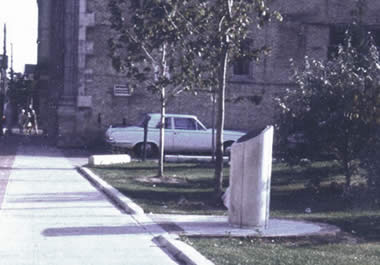 Those who lent their names to the sponsoring committee included His Eminence Emmett Cardinal Carter, Hillary Weston, later to become Lieutenant-Governor of Ontario; Mr. Roy Megarry, publisher of The Globe and Mail; Toronto Mayor Arthur Eggleton; Mr. Arthur Maloney, Q.C.; Lloyd Francis, then Deputy Speaker of the House of Commons; R. Roy McMurtry, Ontario Attorney General, and, of course, David Crombie. One name is missing, that of the originator. At the time he was hale and hearty. In later life he suffered debilitating illness and mental anguish when erratic behaviour, traceable to his medical condition, led to public excoriation and a painfully drawn out resignation from public life. His was a name unknown to me when he arrived at the office I occupied, introduced himself, and said he believed that Francis Collins deserved memorialization. If I agreed, he would form a committee to see it accomplished. In subsequent conversation it transpired that the Senator, for that was what he was, had been born in the very town in Ireland where I had spent most of my youth. Although in the Canadian Parliamentary Guide his birthplace was shown as Belfast, his mother had been visiting Rossnowlagh, a seaside resort in County Donegal, when she went into labour, and Andrew Ernest Joseph Thompson first saw the light of day in the Sheil Hospital, three miles distant, in the town of Ballyshannon. Like many remembered for wrong reasons, the good done by Senator Andrew Thompson during a long life of service to his adopted country, as social worker, member of the Ethnic Press Association of Ontario, refugee spokesman, and later in political life, rising to become Leader of the Liberal Party in the Ontario Legislature, has been forgotten. His action, and the subsequent "go like a bullet" commitment of the Honourable David Crombie, deserve lasting recognition by all who follow in the footsteps of Francis Collins, one-time foe and victim of the infamous Family Compact.
A trio of tall men, Vic Althouse, Les Benjamin, and Lorne Nystrom, all from the same prairie province, Saskatchewan, occupied seats in the House of Commons as members of the New Democratic Party during much of the 1970s and the early 1980s. Why tall men should have been such a physical presence in the party that played such a strong advocacy role for the lesser advantaged in Canadian society since it foundation in 1960 is for others to determine, but if that party has lacked numbers it has certainly not lacked big men. Tommy Douglas and Stephen Lewis senr, its leaders for many years, were not tall men, but that did not detract from the leadership roles they played in bringing universal health care into existence, and improving social services. And they led a united party, a crucial test for all political leaders. Les Benjamin was the first of the trio to be elected as representative for Regina West in the General Election of 1968. A railway man, he had served in the Canadian Armed Forces during WWW II, and had a westerner's innate ability to make friends with members in all parties. He was his party's transport critic, and spoke with the first-hand knowledge of a man who had worked with transport workers and knew the conditions they had to contend with in their daily lives. Les Benjamin was respected for his sincerity. Many mourned with him when he lost a daughter in a sky-diving accident. All regretted the illness against which he struggled during his last year in the House of Commons. That illness forced him to vacate the seat which he had retained through five elections. The Chamber was a less friendly place when he left it. Vic Althouse, Member for Humboldt-Lake Centre, was a farmer with a practical knowledge of agriculture in a number of its branches. Twelve years younger than his colleague, Benjamin, he had been Chairman of the National Farmers Union Grain and Oilseeds Commission, Secretary of the Saskatchwan Hog Marketing Commission, and a member of the Canadian Wheat Board Advisory Committee. He won election to the House of Commons in the General Election of 1980, and with his extensive experience was quickly appointed agriculture critic for the New Democratic Party. He took his task seriously. He spoke directly to the subject under discussion, clearly, articulately, and with understanding, and from a Hansard reporter's viewpoint was one of the easiest Members to report. Destined to serve in Opposition without any realistic hope of ever achieving ministerial responsibility, Althouse persevered in the role for which he was ably suited, and by sheer earnestness and conviction made sure that western agriculture's importance to the national economy was impressed on public consciousness. Lorne Nystrom, once the youngest person to be elected a Member of Parliament in Canada, was the third of the tall men from Saskatchewan. He has proven to be the longest serving member of the trio. At the age of twenty-two he was first elected Member for Yorkton-Melville in 1968, and was its representative in the Commons until 2003. Such longevity in public life on the federal scene was more common in years past. In recent times some Members decide to devote a set number of years to federal politics as part of their career experience. During his time in the House, Lorne Nystrom saw his party's fortunes bring mixed results, but whether returned at each election with more or fewer seats than in the preceding one, he retained his own seat. Competence was the hallmark of his service, to constituents, to party, to Parliament. Where did the appellation "three tall men" come from? It was at the unveiling of the statue on Parliament Hill of another prominent Saskatchewanite, former Prime Minister John George Diefenbaker. Walking back to the Centre Block happenstance threw me into their company. All at once I became aware that, although not lacking in height, I was overshadowed by all three. "Yes," laughed Althouse, "we grow them big out west." They certainly do. In his prime, Diefenbaker himself was not vertically challenged. Crouse was the leading expert in the House on the Atlantic fishery, at least from a practical standpoint. He could claim to have established not one but three fishing companies before entering politics, Crouse Fisheries Ltd., Viking Fisheries Ltd. and Atlas Fisheries Ltd. He also had served his country in wartime as a member of the Royal Canadian Air Force. Lloyd Crouse could talk about the fishery in all its aspects. He knew the risks, physical and financial, involved in manning and operating his own boats, and had particular expertise in the scallop fishery. I never met another man who could talk so knowledgeably about scallops. My own scant acquaintance with sea fishing was limited to jigging for cod on an afternoon fishing tour outside St. John's Harbour in Newfoundland, and a stomach tossing experience on a lobster fishing boat off the north shore of Prince Edward Island. Hence I could not keep up my side of the conversation until I happened to mention a film that had made a great impression on me many years previously, Captains Courageous, starring Spencer Tracey and Freddie Bartholomew. That opened up the floodgates. It turned out that it, also, was one of his favourite movies of all time, and seemingly that was enough to confer on me a status I never merited, that of someone who knew fishing. Quite apart from the fact that he paid particular attention to ensuring he was accurately reported in Hansard -- something all the longer serving members had in common -- Lloyd Crouse was one of the few who was a master of his subject. His service to his constituents, his party, and his country merited his elevation to Lieutenant-Governorship. At some stage in life he concluded that one way to get his message across to an audience was to put it in verse. This, he believed, would implant it in their consciousness. True, it was a device well known and well tested, even before biblical times. Its English language practitioners ran the gamut from Chaucer to the Scottish-born William Topaz McGonagall, almost universally recognized as the worst versifier of his or any other time. At the risk of giving offence, Gordon Tower's poetic effusions were closer in scale to those of McGonagall than of Chaucer. But they were his own, and rightly was he proud of them. He struggled to match them with contemporary events, and probably contributed more versification to the pages of Hansard than any other Member in recent times. They were not appreciated by Madam Sauvé who occupied the Speaker's Chair, and attempted to stem the weekly flow of verse coming from Red Deer's very own rider of the "wingéd horse". The somewhat prim and precise Dinsdale, who was a former Conservative Minister and had once been dubbed "the voice of God", and the rumpled, gravelly voiced Mackasey, Minister of Labour in the Trudeau Liberal government, were opposites in almost every way, political, ideological, and in background, who shared the only bond uniting such disparate characters -- they had sought public office, had offered themselves to the scrutiny of their fellow Canadians, and had been found worthy to be returned to Parliament election after election. Dinsdale was the senior of the two, having been first elected in 1951 as the representative for Brandon-Souris, while Mackasey did not take his seat until 1962. As Minister for Northern Affairs and National Resources, to which portfolio he was appointed in 1960, he made a lasting reputation as promoter of the Roads to Resources program designed to open up the Canadian North to development of its vast mineral and other natural riches. He regaled many an audience with the story of how he came to be dubbed "the voice of God". Having been a veteran of the Royal Canadian Air Force in which he served from 1941 to 1945, and won the Distinguished Flying Cross while with the renowned Mosquito Night Fighter Squadron, he was one of the first to fly a light aircraft when visiting the outlying districts of his riding during an election campaign. The plane was fitted with a loudspeaker system which allowed him deliver a brief message as he flew over the countryside. A farm youngster, who heard that message from on high, went running to his dad to tell him God had just told them to vote for Walter Dinsdale! That Dinsdale always gave the Salvation Army as his religious affiliation somehow gave credence to the story.
He championed the working person so earnestly and forcefully that, as Minister of Labour from 1968 to 1972, he was accused of being overly generous in seeking to provide expensive unemployment insurance benefits. As for his speaking voice, Dinsdale had cause for complaint. It was a Wallace Beery kind of voice, with an occasional mixture of sand which tended to clog his vocal chords, lowering the sound to an almost inaudible pitch. For Hansard reporters in general it presented difficulties. Sometimes a slurred word did not become intelligible until a sentence had been completed, and then it had to be inserted, either going back several lines or making an out-of-place separate notation. Bryce Mackasey's career led in many directions. After holding a number of portfolios he made a surprise switch in 1976, resigning his seat in the federal Parliament to seek, and win, election to the Québec National Assembly. In 1980 he returned to the federal scene and served another four years as a Liberal M.P. Before leaving office in 1984, Trudeau named him Canadian Ambassador to Portugual, an appointment that was abruptly cancelled by Brian Mulroney in a highly unedifying manner when he became Prime Minister later the same year.
Walter Baker, in addition to his multitudinous duties as representative of both an urban and rural area, devoted himself to the task which required his attendance in the Chamber often for lengthy stretches of time. Late on Friday evenings, when all but he had departed on weekly trips home to their ridings, he was the lone member holding the fort, as it were, for his party in the Chamber of the Commons. He was respected by his opposite numbers in other parties, indeed by members in general. A frequent visitor to the Hansard offices, he became a genuine friend to the staff and appreciated the work they did. As a parliamentarian with a known record of service, his appointment to the Clark cabinet in 1979 was greeted with general approval, and he looked fair set to becoming one of its stronger ministers over the course of time. The abrupt termination of that Government, defeated on the notorious "short term pain for long term gain budget" introduced by the Minister of Finance, John C. Crosbie from Newfoundland, came as a resounding shock, not least to Walter Baker, who, because of his previous experience as House Leader, was blamed by some for not postponing the taking of the vital vote until the next day when sufficient numbers of PC members could be present to assure passage of the budget. In hindsight, there were others responsible for the blunder, but Baker, an honourable man, took upon himself more than his share, and it showed. In later months he lost his ebullience. Even later the crushing defeat still showed in his eyes. When illness struck he succumbed, and died at the early age of 53 in 1983. He is memorialized in his hometown, Ottawa, the nation's capital, by the Walter Baker Sportsplex, and is remembered with fondness by all who knew his tireless work on behalf of constituency and country.
One man whose friendship I valued during the years I spent on the Hill arrived there at the early age of twenty-eight years. He won his seat first in the General Election of 1979, and has held it ever since thanks to the electors in the Manitoba riding of Winnipeg-Birds Hill in Winnipeg, later renamed Winnipeg-Transcona. Bill Blaikie has a formidable physical presence and could easily be taken for an ex-lineman on the Winnipeg Blue Bombers professional football team. In actual fact he is a United Church Minister who has succeeded in melding his two callings, church and politics, with ease, something that few have ever accomplished in Canadian public life, at least in recent years. Stanley Knowles, long-time Member of Parliament for the riding of Winnipeg North-Centre, was one of them. Coincidentally, the New Democratic Party claimed their adherence. Over time Blaikie has proven himself to be one of the more eloquent speakers in the House. His sincerity has won him the respect of his peers, and in the inward functionings of the Commons he has played a leading role. His membership of the House's Special Committee on Parliamentary Reform in 1982, and later of the Internal Economy Committee, has given him an expertise in procedure and management not shared by the general body of members. No doubt due to coaching from his older colleague, Stanley Knowles, he came to be a frequent visitor to the Hansard offices, and it was there my personal respect for the man blossomed. Her knew of my Irish background, and revealed that he had Irish connections. It was during the worst years of the recent and, some may say ongoing troubles in what is known as Northern Ireland. He talked knowledgeably about places with the unionist tradition, and I about attending a school in Belfast associated with the nationalist tradition. We deeply regretted what was occurring in that sectarian ridden corner of the country, and learned we could converse freely without bias on events that we were mercifully far removed from, in distance and in spirit. In later years Blaikie has developed masterful skills during the daily Question Period. He is one of the few who eschew reading their questions from prepared texts, and due to quick thinking cuts through ministerial bafflegab to expose incompetence. Other clergy who entered the political arena without lasting success during my years with Hansard swim fleetingly through memory's eye. They include Dan Heap (Spadina), Roland de Corneille (Eglinton-Lawrence), Andy Hogan (Cape Breton-East Richmond), and Bob Ogle (Saskatoon East).
The Honourable Alvin Hamilton, first elected in 1957 as Member for the riding of Qu'Appelle-Moose Mountain in Saskatchewan, was a tall, imposing figure, who commanded attention whenever he spoke either from the Government or Opposition side of the Commons. A navigator who attained the rank of Flight Lieutenant in the Royal Canadian Air Force in which he served from 1941 to 1945, he was a natural leader of men. In the Diefenbaker Government he preceded Walter Dinsdale in the Northern Affairs and Natural Resources portfolio, and made his reputation as Minister of Agriculture, which ministry he made his fiefdom from 1960 to 1963. Hamilton's speaking voice while serving in Opposition suffered as the result of a stroke which mildly affected one side of his face. As the years passed, Hansard reporters had difficulty catching the full intent of what he said, a key word or syllable having been inaudible, but he recognized the fact and always made himself available for later verification. There was one occasion when, in conversation, I threw in a reference to "single speech Hamilton". He was intrigued to learn that his namesake had been a British Member of Parliament to whom Edmund Burke once acted as secretary, and who had gained his name due to the fact that he had spoken only once in Parliament. The same could not be said of his one-time secretary, Burke, and certainly not of Canadian Alvin Hamilton. Alvin Hamilton in later years was credited with nurturing the young Brian Mulroney who, as a university student, served on his election team and experienced at first hand how a successful election campaign should be run. It was a lesson Mulroney learned well, touring the small towns and gravel roads of rural Saskatchewan. In all, he won his seat in ten General Elections, and surprisingly lost it once halfway through his parliamentary life, that being in 1968. From then onwards until his last election in 1984 he was unbeatable. His greatest public success came as Minister of Agriculture when he signed the first major wheat deal between Canada and China in 1960. It was at a time when Canadian granaries were bursting with wheat, and its sale to China added much to the prosperity of Prairie grain farmers. When he retired from the Commons, Alvin Hamilton was one of the very, very few to be granted the privilege of maintaining an office in the Centre Block, which privilege he valued greatly. There he worked on his huge collection of papers, and there he was glad to reminisce on events, great and small, with those who visited him.
At the time of which he wrote, Margaret Thatcher was the Prime Minister of Great Britain, and Jean Wadds was Canada's High Commissioner in London. Personally I have every reason in the world to be glad that Trudeau chose to retain Jean Wadds as High Commissioner. A Tory, she had been appointed by Joe Clark to the post, and might well have been replaced by Trudeau on his return to power. Also at the time of which he wrote I was an associate editor on the Hansard staff in Ottawa unaware that Jean Casselman Wadds was to play a part in my own life. It was as Jean Casselman, the Honourable Member for Grenville-Dundas for ten years from 1958 to 1968, that she was known to us. Her husband, Azra, had held a seat in the House of Commons from 1921 to 1958 and, as was the custom in those days, his widow was chosen as a safe candidate to take his place following his death. That she held the seat for ten more years was evidence that she had earned it in her own right. She had no enemies. She performed capably. And following her defeat, married a gentleman named Wadds. End of story. Not quite. When Clark became PM he plucked her out of retirement and made her Canada's top representative to the Court of St. James. To celebrate the Ottawa Hansard's centennial, a book, "The Hansard Chronicles", was published in 1980, which made its way into parliamentary libraries around the globe. Because it traced the history of parliamentary reporting to the days of William Cobbett and Thomas Curson Hansard in Britain, of Maret in France, and was written by a naturalised Canadian, Mrs. Wadds presented copies to the Speaker of the Westminster House of Commons, and to the Queen's personal library. Back in Canada "The Globe and Mail" made much of these events. To Mr. Trudeau's praise of Mrs. Wadds I add my own humble thanks. Not everyone has a book in the Queen's private library. Sometimes members who come unsummoned to memory's eye are there but briefly, seen in frozen instants of time. One is a member vehemently arguing that he did not say what he said and was reported as saying, that he had checked with colleagues who listened to him and they agreed with him that he did not say it, only to walk silently away when a replayed recording verified the reporter's transcribed note, throwing his spoken words back in his teeth. Another is a member who wheedled and cajoled in an attempt to see another member's "blues" when that was strictly forbidden, and who solemnly contrived at connivance -- "Just slide the typescript across your desk, go into the outer office for a minute, and you won't know what went on while you are gone!" It was a smarmy performance. I had more respect for the bald-faced fibber. Fortunately such instances were rare, and somehow those involved never stayed the course, losing their seats in subsequent General Elections. Members knew that when they attempted to mend their hand, adding to or subtracting from their reported words, they ran the risk of exposure before their peers. They suffered admonition from the Speaker and, worse still, brought the institution itself into disrepute, losing the trust of their colleagues in the process. Overall the conduct of members was admirably straightforward. They had run the gauntlet of public opinion in election after election. They earned the trust of their electors. They conducted themselves responsibly. As men and women in public life they were a credit to their country, to the Canada they sought to serve as best they could. That some caused scandal, resigned in disgrace, or were shunted off into the outer darkness of the Senate or other patronage ridden organizations, cannot be gainsaid. The others, the truly honourable Members of Parliament, deserve the thanks of all Canadians. It was my privilege, and that of my colleagues on Hansard, to have served them to the best of our abilities in our way, in their and our times. They shall live on in memory's eye and in the remembrance of their country in histories yet unwritten. If I have managed to give them a human face in these pages I will consider the effort has been well worthwhile, even more so if readers, including students of all ages, are encouraged to undertake research into the lives of all Canadian men and women parliamentarians as they played out their roles "on the Hill", in the Chamber, corridors, old Reading Room, offices, in Canada's House of Commons.
Home | About | Canadian Vindicator | Literature | Gallery | History
|
||||||||||||||||||||||||||||||||||||||||||||||||||||||||||||||||||||||||||||||||||||||||||||||||||||||||||||||||||||||||||
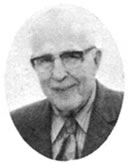 "Is there a doctor in the House?' There was no need to ask that question in the late 1950s and throughout the 1960s. The member for Simcoe East was the doctor on call for any and all emergencies involving colleagues and members of the staff. Philip Bernard Rynard was that member, but I never heard him addressed as other than Dr. Rynard.
"Is there a doctor in the House?' There was no need to ask that question in the late 1950s and throughout the 1960s. The member for Simcoe East was the doctor on call for any and all emergencies involving colleagues and members of the staff. Philip Bernard Rynard was that member, but I never heard him addressed as other than Dr. Rynard.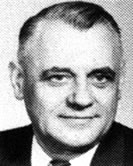 "What did he say, Mike? What did he say?" The man who was asked the question was the Honourable Michael Starr, member for the singularly named riding of Ontario in the province of Ontario, and the man who asked the question was his seatmate, the Right Honourable John George Diefenbaker, his party's chief and Leader of Her Majesty's Loyal Opposition.
"What did he say, Mike? What did he say?" The man who was asked the question was the Honourable Michael Starr, member for the singularly named riding of Ontario in the province of Ontario, and the man who asked the question was his seatmate, the Right Honourable John George Diefenbaker, his party's chief and Leader of Her Majesty's Loyal Opposition.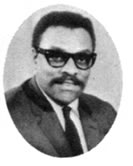 Another to hold the chairmanship of the same but renamed Worker's Compensation Board of Ontario was the Honourable Lincoln Macauley Alexander, who succeeded Starr in 1980.
Another to hold the chairmanship of the same but renamed Worker's Compensation Board of Ontario was the Honourable Lincoln Macauley Alexander, who succeeded Starr in 1980.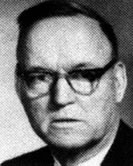
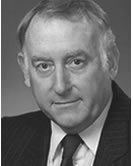
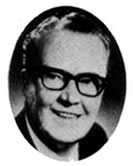
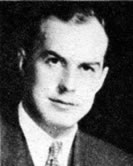 The Honourable Léon Balcer was a mild-spoken man who deserved greater recognition than he received from the PC party of which he was a stalwart supporter in his native Province of Québec in good times and in bad.
The Honourable Léon Balcer was a mild-spoken man who deserved greater recognition than he received from the PC party of which he was a stalwart supporter in his native Province of Québec in good times and in bad.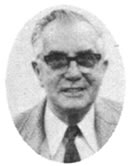 Gerald (Jed) William Baldwin, the Member for Peace River in "the high sky country" of northern Alberta, will be remembered for the many years during which he strove to improve the image and effectiveness of Parliament.
Gerald (Jed) William Baldwin, the Member for Peace River in "the high sky country" of northern Alberta, will be remembered for the many years during which he strove to improve the image and effectiveness of Parliament.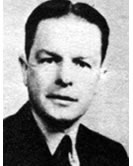 In any work dealing with the post-war House of Commons from 1945 onwards, the name Benedickson comes prominently to the fore.
In any work dealing with the post-war House of Commons from 1945 onwards, the name Benedickson comes prominently to the fore.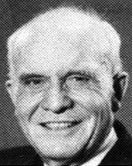 Another veteran of war who served in Diefenbaker's cabinet was the Honourable Gordon Minto Churchill (Winnipeg South Centre), a warriors' warrior, both militarily and politically.
Another veteran of war who served in Diefenbaker's cabinet was the Honourable Gordon Minto Churchill (Winnipeg South Centre), a warriors' warrior, both militarily and politically.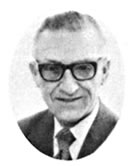 I listened to the results coming in on election day in 1963 at a friend's apartment in Vancouver, in company with another colleague, Roger White. That General Election was the one in which the fledgling federal Social Credit Party made its breakthrough under the leadership of Bob Thompson, the Member for Three Hills in the province of Alberta.
I listened to the results coming in on election day in 1963 at a friend's apartment in Vancouver, in company with another colleague, Roger White. That General Election was the one in which the fledgling federal Social Credit Party made its breakthrough under the leadership of Bob Thompson, the Member for Three Hills in the province of Alberta.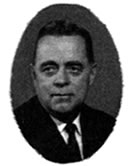 Robert Thompson, titular head of the federal Social Credit Party, is not so easy to limn. He had no prepossessing features. In memory's eye he is not tall, not short, not slight, tending more to well-fleshed than heavy set. He did not have a commanding voice, and the political fates did not deal kindly with him. He saw his party sprout, become tangled in internal divisions, and its roots shrivel and die, all within a relatively small number of years.
Robert Thompson, titular head of the federal Social Credit Party, is not so easy to limn. He had no prepossessing features. In memory's eye he is not tall, not short, not slight, tending more to well-fleshed than heavy set. He did not have a commanding voice, and the political fates did not deal kindly with him. He saw his party sprout, become tangled in internal divisions, and its roots shrivel and die, all within a relatively small number of years.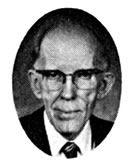 "A printer and a minister." That is how his long-standing entry in the annual Canadian Parliamentary Guide described him. It should have included one more vocation "and a parliamentarian."
"A printer and a minister." That is how his long-standing entry in the annual Canadian Parliamentary Guide described him. It should have included one more vocation "and a parliamentarian."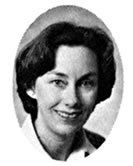 In the politically correct atmosphere of the first decade of the Twenty-first century it takes a little courage to tackle the place of women in Canada's Parliament in the second half of the Twentieth century. An attempt to tell it like it was, especially when that attempt is made from the viewpoint of a male observer, may not please either camp, and the word "camp" is used advisedly.
In the politically correct atmosphere of the first decade of the Twenty-first century it takes a little courage to tackle the place of women in Canada's Parliament in the second half of the Twentieth century. An attempt to tell it like it was, especially when that attempt is made from the viewpoint of a male observer, may not please either camp, and the word "camp" is used advisedly.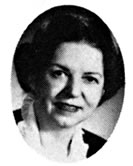 Another lady from Toronto who added lustre to the Commons and had the respect of members on both sides was the Honourable Aideen Nicholson who, quite fittingly, had as her electoral area the riding of Trinity.
Another lady from Toronto who added lustre to the Commons and had the respect of members on both sides was the Honourable Aideen Nicholson who, quite fittingly, had as her electoral area the riding of Trinity. An adornment to Québec and Canada was the Honourable Monique Bégin, the hard working Member for Laurier, who served contemporaneously with Aideen Nicholson as a member of the Liberal Party in the Commons.
An adornment to Québec and Canada was the Honourable Monique Bégin, the hard working Member for Laurier, who served contemporaneously with Aideen Nicholson as a member of the Liberal Party in the Commons.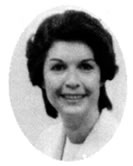 Canadians watching televised Remembrance Day services on November 11, 2002, saw a wonderfully moving ceremony held deep in the rain forest of the Queen Charlotte Islands. The site, far removed from the familiar setting of stone cenotaphs and bronze statuary in town and city centres, lent its own somberness to the celebration. The forest quietness, the wet ground, the moss covered tree trunks, even the broken remnants of a crashed air force training plane, added to the solemnity of the ceremony.
Canadians watching televised Remembrance Day services on November 11, 2002, saw a wonderfully moving ceremony held deep in the rain forest of the Queen Charlotte Islands. The site, far removed from the familiar setting of stone cenotaphs and bronze statuary in town and city centres, lent its own somberness to the celebration. The forest quietness, the wet ground, the moss covered tree trunks, even the broken remnants of a crashed air force training plane, added to the solemnity of the ceremony.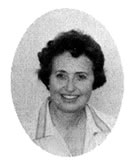 Another lady from British Columbia, bearing a completely different personality, who blazed her way into the Commons was the indomitable Simma Holt.
Another lady from British Columbia, bearing a completely different personality, who blazed her way into the Commons was the indomitable Simma Holt.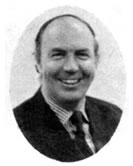 The Honourable Donald Stovel Macdonald, long-time Member for Toronto-Rosedale, and life-long member of the Liberal Party, once made parliamentary history and didn't know it.
The Honourable Donald Stovel Macdonald, long-time Member for Toronto-Rosedale, and life-long member of the Liberal Party, once made parliamentary history and didn't know it.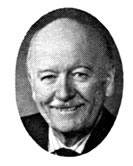 Two more contrasting personalities could hardly be imagined, the quiet, earnest Alan McKinnon, and the loquacious Donald Munro. They were less than a year apart in age, Munro having been born in April 1916, and McKinnon in January 1917.
Two more contrasting personalities could hardly be imagined, the quiet, earnest Alan McKinnon, and the loquacious Donald Munro. They were less than a year apart in age, Munro having been born in April 1916, and McKinnon in January 1917.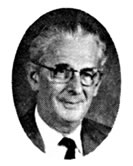 Donald Munro, the consummate diplomat, wove a skein of well polished courtesy into his dealings with colleagues, but forever is associated with one flaw, not of character, honour, or sincerity, but simply that, despite experience after experience with Ottawa winters, he never carried jumper cables in his car.
Donald Munro, the consummate diplomat, wove a skein of well polished courtesy into his dealings with colleagues, but forever is associated with one flaw, not of character, honour, or sincerity, but simply that, despite experience after experience with Ottawa winters, he never carried jumper cables in his car.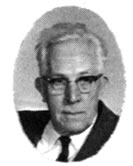 In the section on
In the section on 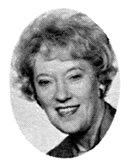 "Flora". That. Only that. Seldom is it given to one person to have but one name. Mary Queen of Scots. Elizabeth of England. Joan of Arc. They all carried their own special designation. But Flora? Flora of Canada? Flora of Kingston? The very thought is ridiculous.
"Flora". That. Only that. Seldom is it given to one person to have but one name. Mary Queen of Scots. Elizabeth of England. Joan of Arc. They all carried their own special designation. But Flora? Flora of Canada? Flora of Kingston? The very thought is ridiculous.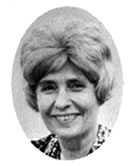 "Auntie Grace". That was always how she was known to the people of Hansard. To the people of British Columbia, indeed to Canadians everywhere, she was both the loneliest and the most revered woman in Parliament.
"Auntie Grace". That was always how she was known to the people of Hansard. To the people of British Columbia, indeed to Canadians everywhere, she was both the loneliest and the most revered woman in Parliament.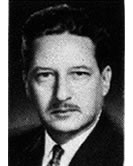 Westminster has a much longer history of sex scandals than Parliament Hill, but uniting the English and Canadian Parliaments was a credo of silence, especially in the early post World War II era. Each in its own way was a hotbed of gossip, rumour, and speculation where such affairs were concerned, but there existed an unspoken understanding that private lives were not fair game for "the gentlemen of the Press" at a time when that was what they were called.
Westminster has a much longer history of sex scandals than Parliament Hill, but uniting the English and Canadian Parliaments was a credo of silence, especially in the early post World War II era. Each in its own way was a hotbed of gossip, rumour, and speculation where such affairs were concerned, but there existed an unspoken understanding that private lives were not fair game for "the gentlemen of the Press" at a time when that was what they were called.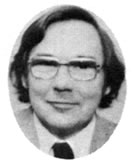 The Chamber was empty. Members had gone to lunch. Nobody was in the galleries. Yet there was a voice faintly heard outside the locked doors.
The Chamber was empty. Members had gone to lunch. Nobody was in the galleries. Yet there was a voice faintly heard outside the locked doors.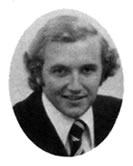 "There are very few saints on Parliament Hill" was a famous remark uttered by long-time Liberal strategist Alan MacEachen, wily Member of Parliament from Cape Breton, credited with returning Prime Minister Trudeau to power after the nine-month interregnum created by the Clark administration in 1981.
"There are very few saints on Parliament Hill" was a famous remark uttered by long-time Liberal strategist Alan MacEachen, wily Member of Parliament from Cape Breton, credited with returning Prime Minister Trudeau to power after the nine-month interregnum created by the Clark administration in 1981.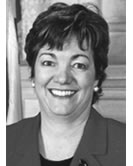
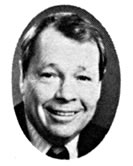 "Tell me what you want me to do and I'll go like a bullet!" To say I was bowled over by that statement would be an understatement. This had been one of the most prominent Ministers in government and he was offering his help unreservedly, without hesitation, in forwarding a project which he had just learned about minutes previously.
"Tell me what you want me to do and I'll go like a bullet!" To say I was bowled over by that statement would be an understatement. This had been one of the most prominent Ministers in government and he was offering his help unreservedly, without hesitation, in forwarding a project which he had just learned about minutes previously.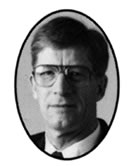
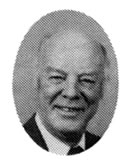
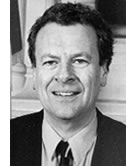
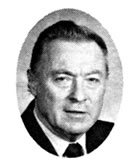 Nova Scotia had one of the longer serving members in the person of Lloyd Crouse during the period covered by these memories. He was first elected as the Member for South Shore in 1957 and retained his seat during the next ten General Elections, ending his lengthy career in public life by being appointed Lieutenant Governor of his native province.
Nova Scotia had one of the longer serving members in the person of Lloyd Crouse during the period covered by these memories. He was first elected as the Member for South Shore in 1957 and retained his seat during the next ten General Elections, ending his lengthy career in public life by being appointed Lieutenant Governor of his native province.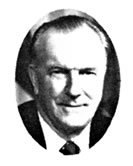 Another Member of Parliament who ended up as Lieutenant Governor of his province was Gordon Towers, who represented the riding of Red Deer in Alberta. He was a farmer who rhymed, or a rhymer who farmed. Sometimes it was difficult to distinguish one from the other.
Another Member of Parliament who ended up as Lieutenant Governor of his province was Gordon Towers, who represented the riding of Red Deer in Alberta. He was a farmer who rhymed, or a rhymer who farmed. Sometimes it was difficult to distinguish one from the other.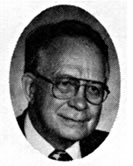 "I've listened to that man ever since he came here, and I've never understood a word he's spoken." A harsh judgment? In a way, but reflective of both parties, the Hon. Walter Dinsdale who uttered the words to his seatmate, and the Hon. Bryce Mackasey who was addressing the House.
"I've listened to that man ever since he came here, and I've never understood a word he's spoken." A harsh judgment? In a way, but reflective of both parties, the Hon. Walter Dinsdale who uttered the words to his seatmate, and the Hon. Bryce Mackasey who was addressing the House.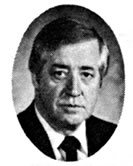 Bryce Mackasey was cut from different cloth. A stereotypical Irish-Canadian born in Québec City, he was a people person, a mixer, with a gift for ingratiating himself with whatever company he found himself in, even though they might initially be reluctant to admit him.
Bryce Mackasey was cut from different cloth. A stereotypical Irish-Canadian born in Québec City, he was a people person, a mixer, with a gift for ingratiating himself with whatever company he found himself in, even though they might initially be reluctant to admit him.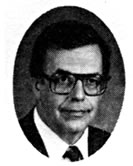 Politics can exert a toll even on the most robust frame. A prime example was the Honourable Walter Baker, Member for Nepean-Carleton and Minister for National Revenue in the nine-months long Progressive Conservative Government in 1979. A big, bluff, genial man, he first entered the House of Commons in 1972, and as House Leader for his party put in long hours on what most House Leaders of all parties regard as a thankless task. Being a resident of the National Capital area, living less than half an hour from Parliament Hill, made him a natural choice for the post. It was assumed he could devote more time to the job than someone representing a far away constituency in the Maritimes, Prairies, or on the Pacific Coast.
Politics can exert a toll even on the most robust frame. A prime example was the Honourable Walter Baker, Member for Nepean-Carleton and Minister for National Revenue in the nine-months long Progressive Conservative Government in 1979. A big, bluff, genial man, he first entered the House of Commons in 1972, and as House Leader for his party put in long hours on what most House Leaders of all parties regard as a thankless task. Being a resident of the National Capital area, living less than half an hour from Parliament Hill, made him a natural choice for the post. It was assumed he could devote more time to the job than someone representing a far away constituency in the Maritimes, Prairies, or on the Pacific Coast.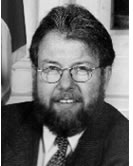
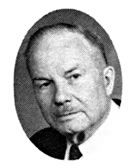 One Member who had long service in the House of Commons was a notable figure in an earlier and longer lasting Progressive Conservative Government. As related elsewhere in the section of this book dealing with Canadian Prime Ministers, I became aware of the gentleman's existence through the pages of The Times of London which I read aboard the flight taking me from Ireland to Canada in 1960.
One Member who had long service in the House of Commons was a notable figure in an earlier and longer lasting Progressive Conservative Government. As related elsewhere in the section of this book dealing with Canadian Prime Ministers, I became aware of the gentleman's existence through the pages of The Times of London which I read aboard the flight taking me from Ireland to Canada in 1960.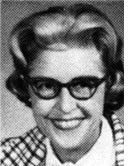 "I always say that it was thanks to three women that we were eventually able to reform our constitution -- the Queen, who was favourable, Margaret Thatcher, who undertook to do everything that our Parliament asked of her, and Jean Wadds, who represented the interests of Canada so well in London." (P. E. Trudeau, Memoirs p.311, McClelland & Stewart Inc., Toronto, 1993)
"I always say that it was thanks to three women that we were eventually able to reform our constitution -- the Queen, who was favourable, Margaret Thatcher, who undertook to do everything that our Parliament asked of her, and Jean Wadds, who represented the interests of Canada so well in London." (P. E. Trudeau, Memoirs p.311, McClelland & Stewart Inc., Toronto, 1993)